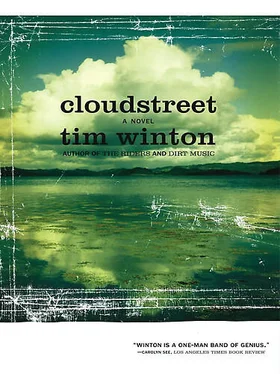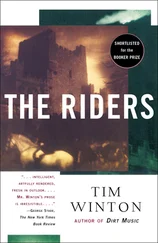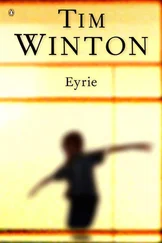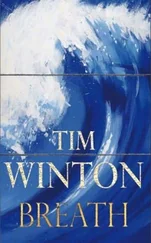Late in the week, on Sunday, Quick took a couple of tin buckets full of overripe prawns and handlines, and in Earl’s newpainted dory he rowed round the bend to the great tear-shaped lagoon behind the sandbar. As he came into the flat shoaly stretch of water he met the memory of them all down here at dusk with the fire on the beach, the lantern, the net sluicing along. He set his jaw and kept rowing.
Mullet rushed in mobs across the ribbed bottom. A burnt out Ford stood back from the shore in the shade of trees. The surf rumbled beyond the bar. Quick did a lazy circuit resting one oar and pulling easy on the other. He had the feeling of movement going right through him. Water passed beneath, the trees up the bank rode by, but inside himself he felt something travel, the kind of transport he felt at the beginning of sleep when he sensed himself going out to meet its sky colour and the promises it held. He let go of the oars and just sat feeling queer. Someone walked in the shadows beyond the trees, or maybe it was a roo or just a stray cow turning. It caught his eye, whatever it was, and his insides queered up a little more. Presently, a broad, frisky school of mullet cracked the surface and bore round him, funneling down the tide ribs to the deep seaward slope of the bottom and he watched them go, that uniform mob, and felt cheered by their nerve.
The boat sat well in the water, evenly hipped and clean painted. In their rowlocks, the oars knocked and creaked with business. The working, operating feel of things pleased Quick Lamb. There was nothing more warming than the spectacle of something proceeding properly after a due amount of work. He was like that with rifles, with motors, drum reels, or some fancy madhouse’s new flushing toilet. If you didn’t know how they worked, then things weren’t worth having — something the old girl used to say.
He pulled across to the narrow point of the bottleneck where the river squeezed out in a cool tea-coloured trickle to the sea and the disturbance of the two bodies meeting caused a roily, chopbroken channel that led out through the surf to the deep beyond. Quick wedged his way into the channel, picked his moment after a set came through, and went like hell. He heard the squeaking and creaking and the airbrake sound of his breath, the bow lifting under him, pushing his bum cheeks together. The sensations were clear and momentous. The sight of foam cracking down the sides and rushing astern, the smell of salt and paint and his bait prawns on the turn. Above him, the sky like a fine net letting nothing through but light and strangeness.
About five hundred yards out, over a wide patch of sandy bottom, he dropped the hook and felt the boat hang back on it. He baited up and then it began. The first bite rang in his wrist like the impact of a cover drive, a bat and ball jolt in his sinews. From below, a skipjack broadsided and bore down on the hook in its palate, sending water springing from the line as it came up. Then he saw another lunging toward it, and when he hauled the fish into the boat, it was two fish, one fixed to the tail of the other. They thumped in the bottom round his ankles, the size of big silver slippers. He baited up again and cast out. He got a strike the moment the hooks hit the water, and then another, and when he saw the upward charge of the mob he felt something was happening that he might not be able to explain to a stranger. He dragged in four fish, two hooked and two biting their tails. He caught them cast after cast, sometimes three to a hook, with one fish fixed to the passenger fish. His hands bled and his arms ached. In his eyes the sweat rolled and boiled. Now the boat vibrated like a cathedral with all these fish arching, beating, sliding, bucking, hammering. In the water they bludgeoned themselves against the timbers, shine running off them in lurches, stirring the deep sandy bottom into a rising cloudbank until Quick was throwing out baitless hooks to drag in great silver chains of them. They shone like money. They slid and slicked about his knees. Quick Lamb’s breathing got to be a hacking just short of a cough, and in the end he stopped casting and lay back in the smother and squelch of fish as they leapt into the boat of their own accord.
The sun was a penny on each of his eyelids. Fish made space for him. They embraced him in their scaly way and he heard their mouths open and close. He felt them slide across his chest as his head sank into them, against his cheeks, along his lips with the briny taste of Lucy Wentworth’s business bits. He began to breathe them, stifle beneath them. He struggled up, began to row, and completed two neat circles before he remembered the anchor. He pulled the hook, coiled rope and chain and watched the lot sink into the mass of fish. He got sensible.
He picked a landmark to row for, and settled in for the long, methodical pull. Once, when he glanced across his shoulder to check his bearing, he saw the figure of a man walking upon the water and it made him laugh. He got sensible again and had another look.
The man seemed to come closer.
He’s on a shallow bar, thought Quick, getting desperately sensible.
He was black.
But everyone’s black at a distance, he thought.
Quick didn’t look anymore. He was fished up to the gunwales with about an inch of freeboard so that a decent lungful of air would send him under.
Just outside the surf line, the boatful of fish gouted up blood, died, and sank the boat. For a moment, Quick Lamb kept rowing because his head was still out of the water and he still had the family stubbornness in him.
When he got to shore, the blackfella was waiting for him in a pair of calico pants and a British battlejacket. Quick could see the waterline on his night blue ankles. The black man smiled. He seemed to be holding back a belly laugh.
Quick pushed past him and didn’t look back.
On the long, impossibly slow drive back to Earl and May’s with the prospect of breaking the bad news before him, Quick kept seeing figures. Along the road every mile or so, some mad bugger would jump out waving from behind a karri tree. Half the time it was that black bastard and the other half it was him. The old Dodge wheezed and Quick abused all comers. He flattened the accelerator but he still could have walked faster.
Nothing computes. Every moment, each vision and image elbows up to the next in Quick’s mind, bumping, sliding, rubbing hot and useless in him till he feels like his head is the groanstuffed hold of a ship in a gale. Out beyond the oily dark yard at twilight he climbs up into the plywood caravan, falls on his cot and lies there without knowing how the bloody hell it took him three hours to get back from a thirty-minute drive. He knows he’s not crazy, he’s convinced of it, and he’s right. But he’s not firing on all six, that’s for sure, because as he lies there, buckled and ready to stop breathing at any moment, he knows he can’t decide how he feels — enlightened or endangered, happy or sad, old or young, Quick or Lamb.
Sometime in the night, the misery pictures begin to vibrate above his head. Burnt babies, Koreans, old amputee diggers, a blind nun, they all jig on the wall, roll their eyes, hum like a turbine, sending Quick into an alertness even more discomforting and disabling.
He dreams he is asleep, and that in sleep he’s dreaming a dream: there they all are, down by the river laughing and chiacking about, all of them whole and true, with their own faces in a silver rain of light fused with birds and animals. Lester, Oriel, Hat, Elaine, Lon, Red, Fish, himself, and people he doesn’t know: women with babies, old people, men with their sleeves pinned, barefoot children, all moving behind a single file of other people the colour of burnt wood. Down at the river where the fish are leaping and the sea has turned back on itself and the trees shake with music.
Читать дальше












